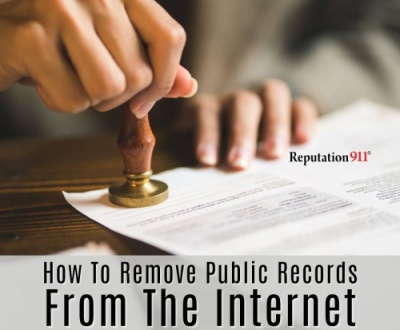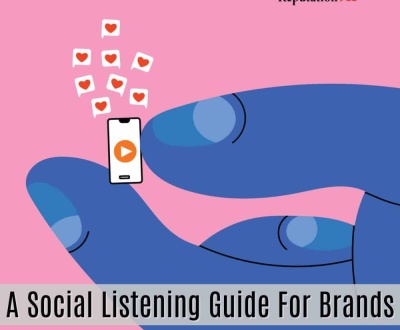What is Reputation Management? Your Complete Guide
- January 8, 2018
- Reputation Management
Last Updated on April 4, 2024
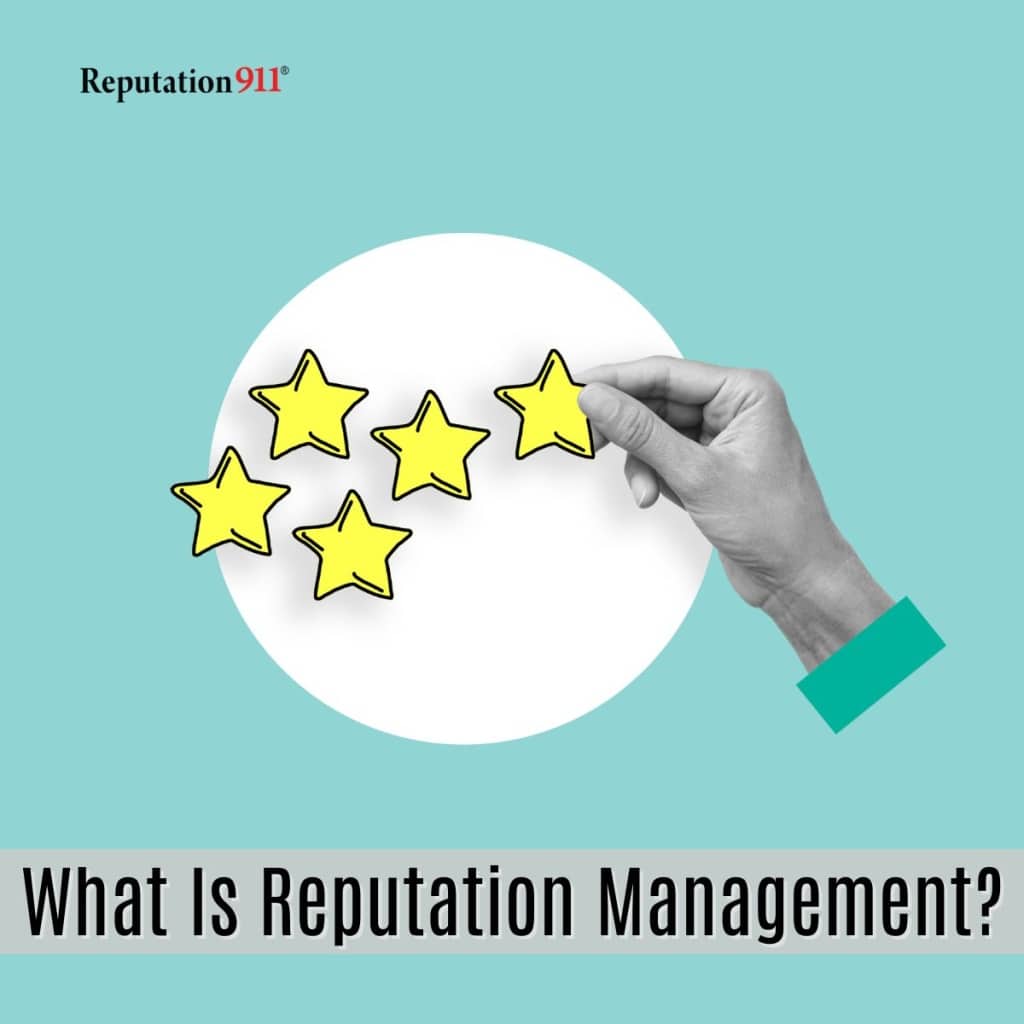
In this article, you will learn what reputation management is, its importance, and its benefits. We’ll also teach you strategies you can start using today.
Reputation Management Definition
Online reputation management (ORM) allows brands and individuals to influence how people view them online. This process works to improve overall brand sentiment and public perception.
You can’t control what other people say about you online. However, certain things are in your control. This includes the content you publish, how you respond to feedback, and addressing libel and defamation. Being proactive about these things influences the public conversation about you.
Why Online Reputation Management Is Important (5 Benefits)
For both individuals and businesses, your online reputation exists whether you want it to or not. It consists of anything online that people associate with your name, business, or brand. Your search results, whether good or bad, directly affects people’s perception of you before you ever meet them.
That’s why being intentional about it matters. Here are 5 benefits of reputation management:
Promote your brand and stand out online
Online reputation management (ORM) is not just for large businesses, but necessary for personal brands as well. By proactively managing your online presence, you enhance your appeal to your target audience.
For personal brands, ORM helps you showcase your expertise, achievements, and professionalism. You get to tell your own story and build up authority in your field.
For business brands, ORM helps companies differentiate themselves in a crowded marketplace and create happy, loyal customers. Happy customers translates to better word-of-mouth marketing, thus creating even more customers.
Improve consumer trust
Today, 95% of consumers look at online reviews before making an online purchase, according to Luisa Zhou. 94% of consumers also say that they avoided a business with negative reviews. Your business could lose money based on a few bad reviews, but reputation management can help you stay on top of it.
Reach higher profits for your company
Having a positive online reputation means that consumers trust you, which is key to encourage them to buy from you. Consumers are more likely to purchase from brands with positive reviews and a strong online presence.
A good online presence also fosters loyalty, giving your brand a higher customer lifetime value. Customers are also more willing to pay a premium for products and services from a trusted brand.
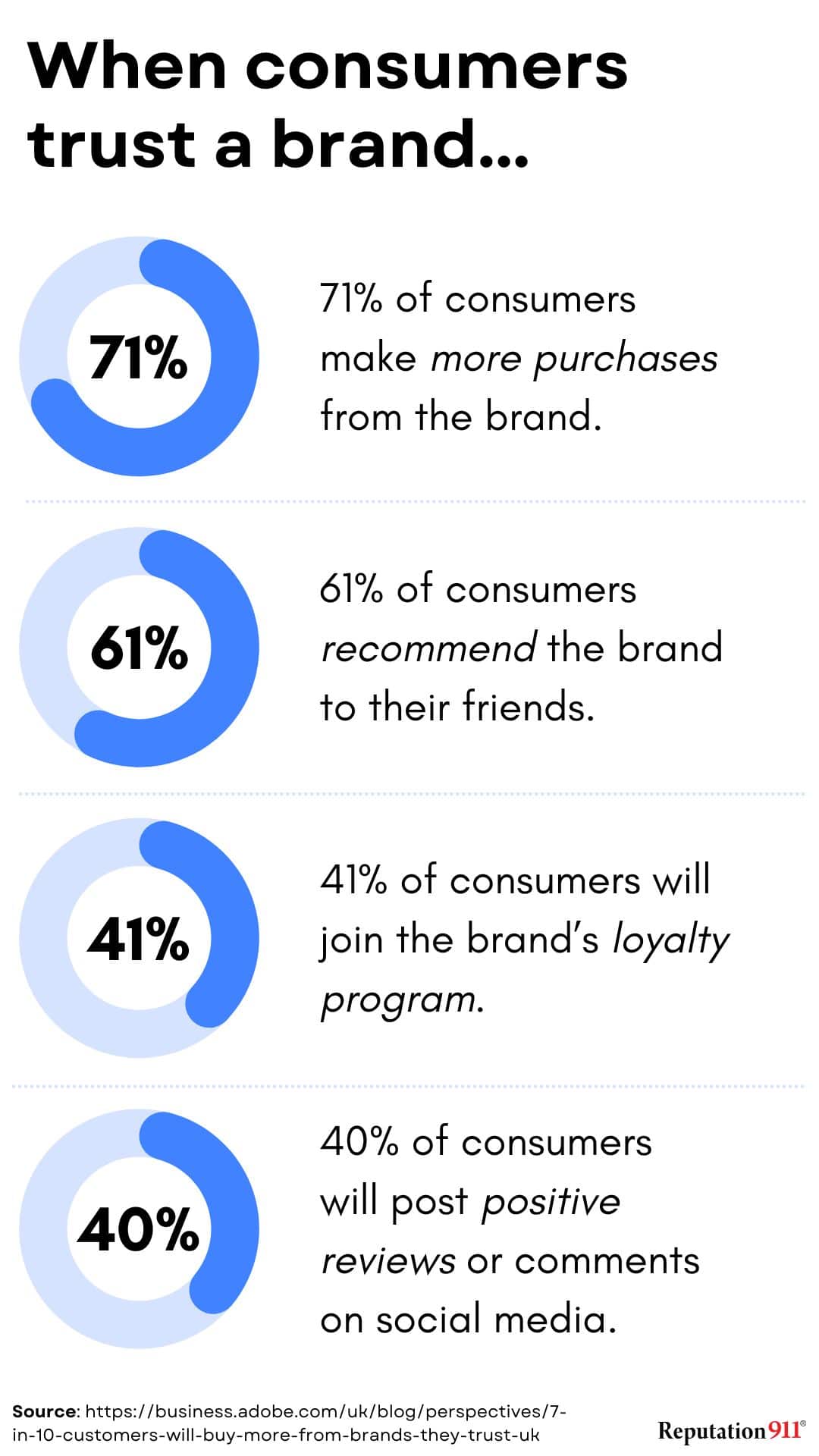
Consumer trust has many benefits for brands. According to Adobe, when consumers trust a brand, 71% will make more purchases, 61% will recommend the brand to their friends, 41% will join the brand’s loyalty program, and 40% will post positive reviews or comments on social media.
Attract top talent
Your business’s reputation directly impacts whether or not people want to work for you. On sites like Glassdoor, job seekers can read reviews about your business from former employees. If highly qualified candidates see something they don’t like, they will apply elsewhere.
Find better opportunities
A positive reputation means that people are more likely to work with you. This is true whether you’re a job seeker, influencer, freelancer, business owner, etc. When people see you as a thought leader in your field or industry, they will listen to what you have to say.
Who Needs Reputation Management?
With the internet the way it is these days, most people can benefit from reputation management. Ask yourself these questions to determine whether or not you need help:
- Have you been missing out on career opportunities?
- Are clients or new sales leads not responding to you?
- Is there negative online press about yourself or your business?
4 Types of Reputation Management
Now, how do you decide what type of reputation management services you need? Here are the 4 main categories of services available to help you. Keep in mind, these categories do tend to overlap.
Personal Reputation Management
Personal reputation management is all about how you represent yourself online as an individual. In today’s world where everyone cyber stalks everyone, it is more important than ever.
For students applying to colleges, reputation management can help you get into the college of your choice. According to Parent Map, 67% of colleges research potential candidates on Google. A further 25% of admissions counselors admit to checking out students’ social media profiles.
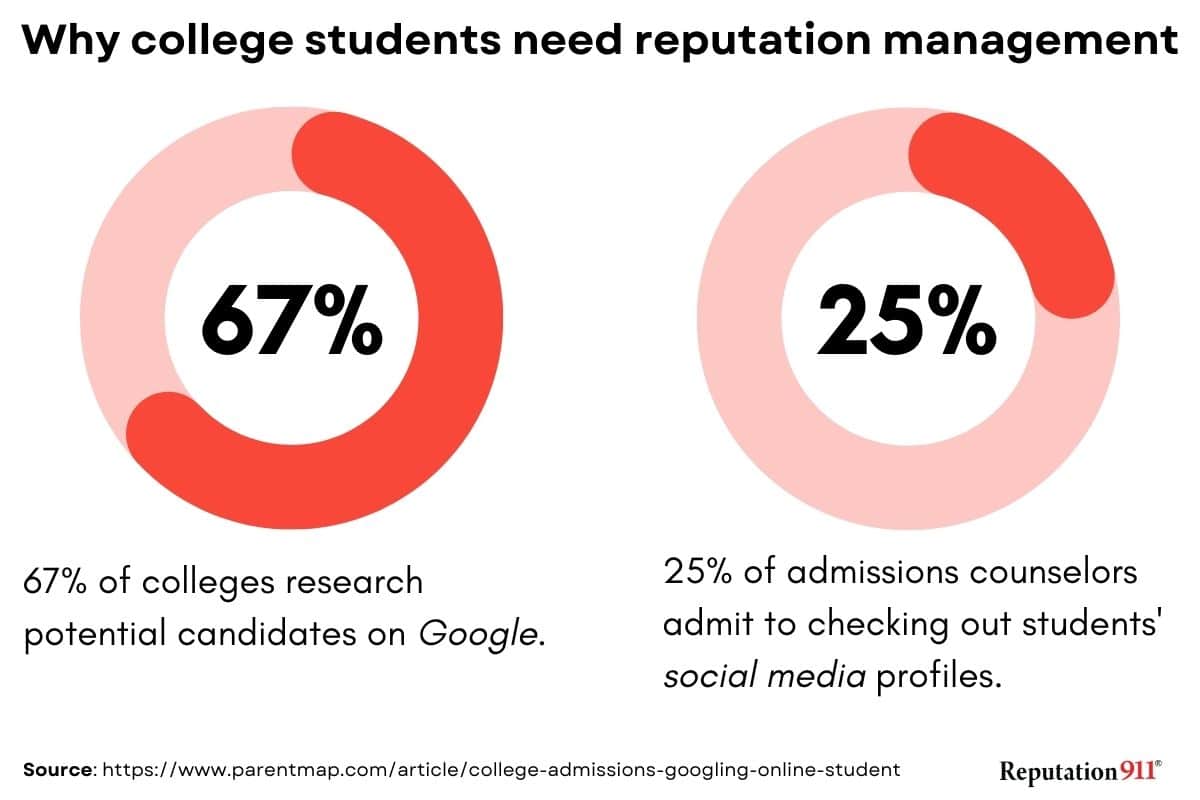
According to Parent Map, 67% of colleges research candidates on Google. 25% of admissions officers also admit to checking out students’ social media profiles. Students can use personal reputation management to help them get into the college of their choice.
If you’re a working professional in any capacity, negative search engine results can be a detriment to your career. According to Career Builder, 69% of employers use search engines like Google, Bing, and Yahoo to research candidates.
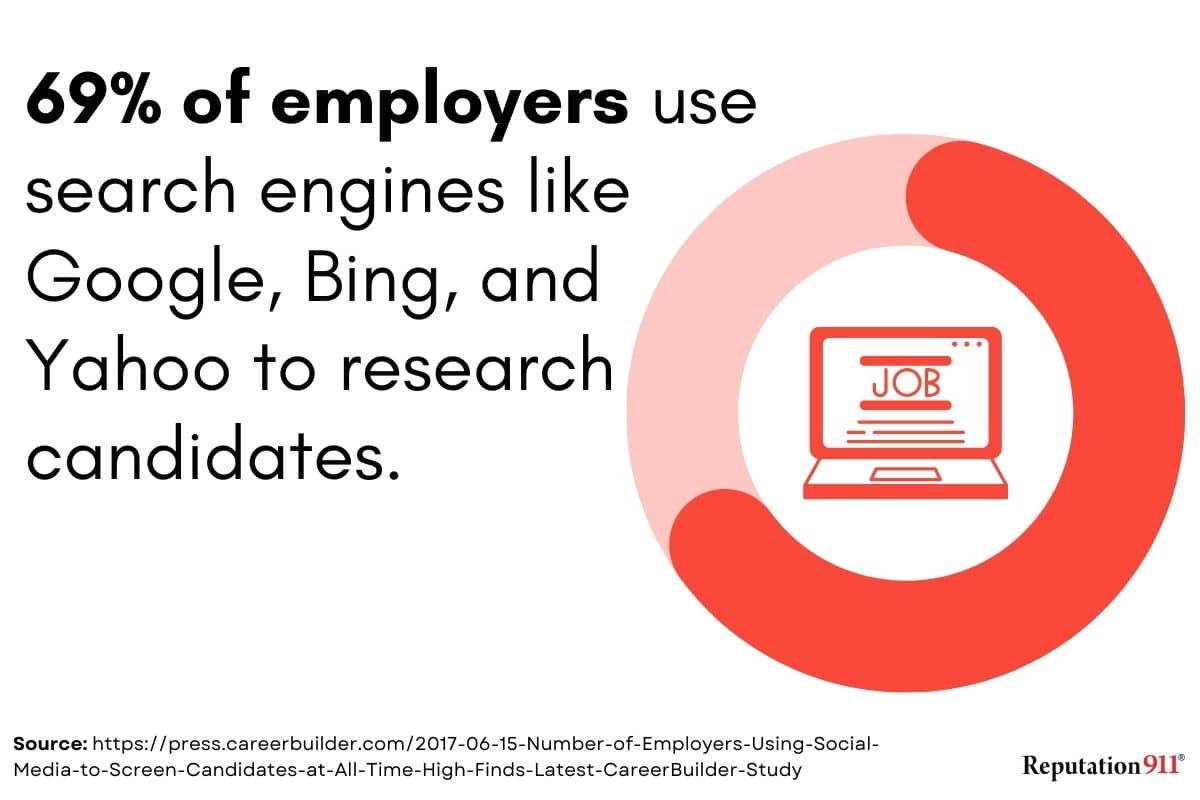
Negative search results could prevent you from landing your dream job. According to Career Builder, 69% of employers research candidates on search engines like Google, Bing, and Yahoo.
Salespeople may lose clients or have trouble gaining meetings. Freelance or contract workers can lose work opportunities if negative content ranks highly in search results.
Brand Reputation Management
Brand reputation management is all about how corporate brands represent themselves online. For brands, managing your online image has a direct impact on revenue. For businesses, online reviews play a critical role.
According to Search Engine Land, 88% of customers find online review sites to be trustworthy sources. Online consumers use reviews to determine whether or not a business is of quality. 85% of consumers say they are satisfied with the quality of a local business once they read up to 10 reviews.
Too much negative feedback, customer reviews, or content means negative impacts how potential customers experience your brand. They may choose to turn to your competitors instead.
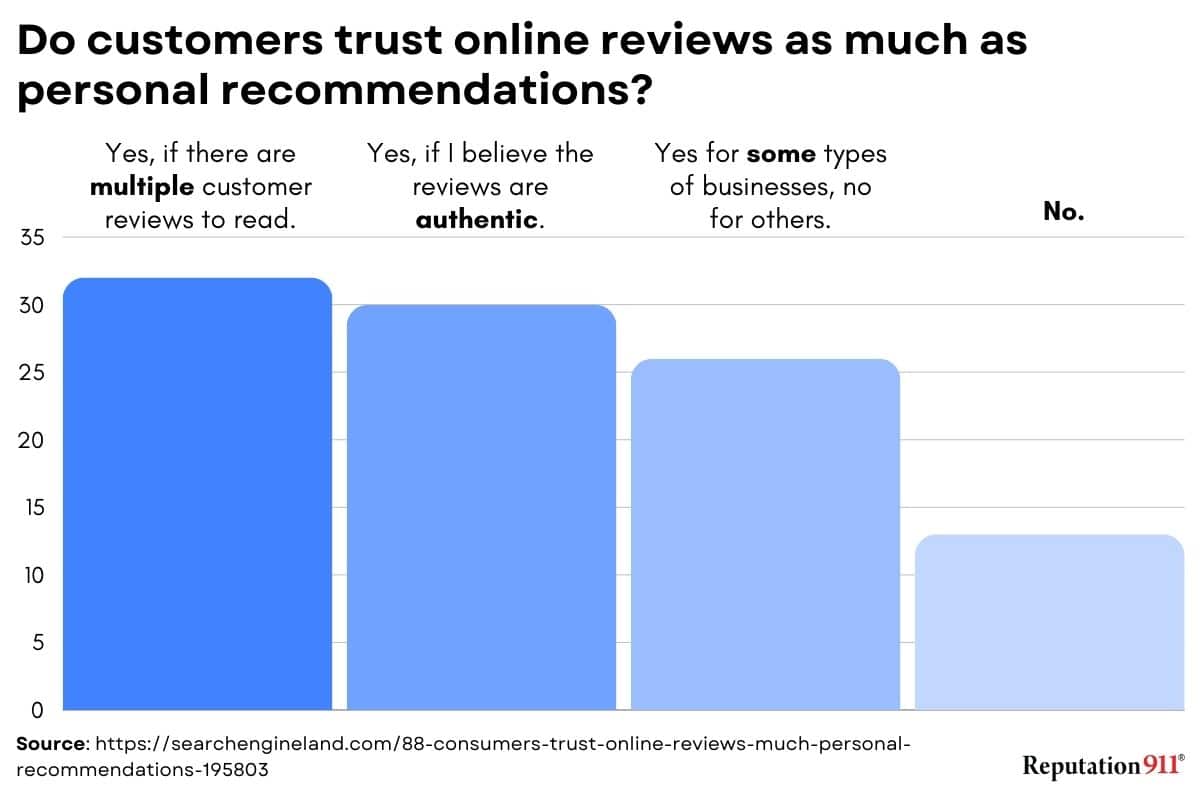
According to Search Engine Land, 88% of consumers trust online reviews as much as personal recommendations from friends and family. Reputation management can help brands boost positive reviews and achieve their sales goals.
Online Reputation Management
Online reputation management focuses on what people say about you or your brand online. Google yourself or your business and keep a note of the results you find. Some important areas to look at include:
- review sites
- social media posts and overall social media presence
- images and videos
- articles and blog posts
- comments
All these areas factor into your online image, especially if they appear highly in search results.
If searchers see negative links when they Google your name or business, it lowers their ability to trust you. In the digital space, that first page of Google search results is your online “first-impression”. If they see bad content, they will search elsewhere. However, if they see positive content, people will be more loyal to your brand.
Online Privacy Management
Internet privacy management means keeping your name and information private on the internet. These days, your information can appear online in places you never expected.
Online privacy management services remove unwanted links from your search results. Unwanted links can include blog posts, images, videos, addresses, phone numbers, and other personal information.
9 Online Reputation Management Strategies
Reputation management is all about displaying your brand in the best possible light. Here are some strategies to control what people see about you online:
1. Remove negative content
Negative content removal is the first step in controlling your search results. However, removing everything from the internet is rarely possible because you just can’t control what other people publish.
If a publisher refuses to remove content or you can’t reach them, consider submitting a DMCA Takedown notice.
2. Create your own website
Creating your own website is a critical part of reputation management. On your own website, you have direct control over what you publish about yourself. You essentially have a direct line of communication between yourself and the world. Having your own website also makes SEO strategies more effective (more on that below).
3. Google search suppression
You likely can’t remove all of your negative search results from the internet, however, you can suppress them. With SEO and keyword optimization, you can optimize any websites you own to push negative search results down.
Essentially, the more that your own websites rank highly in search results, the less negative results people will see. By pushing negative search results down to the second or third page of Google, hardly anyone will see them.
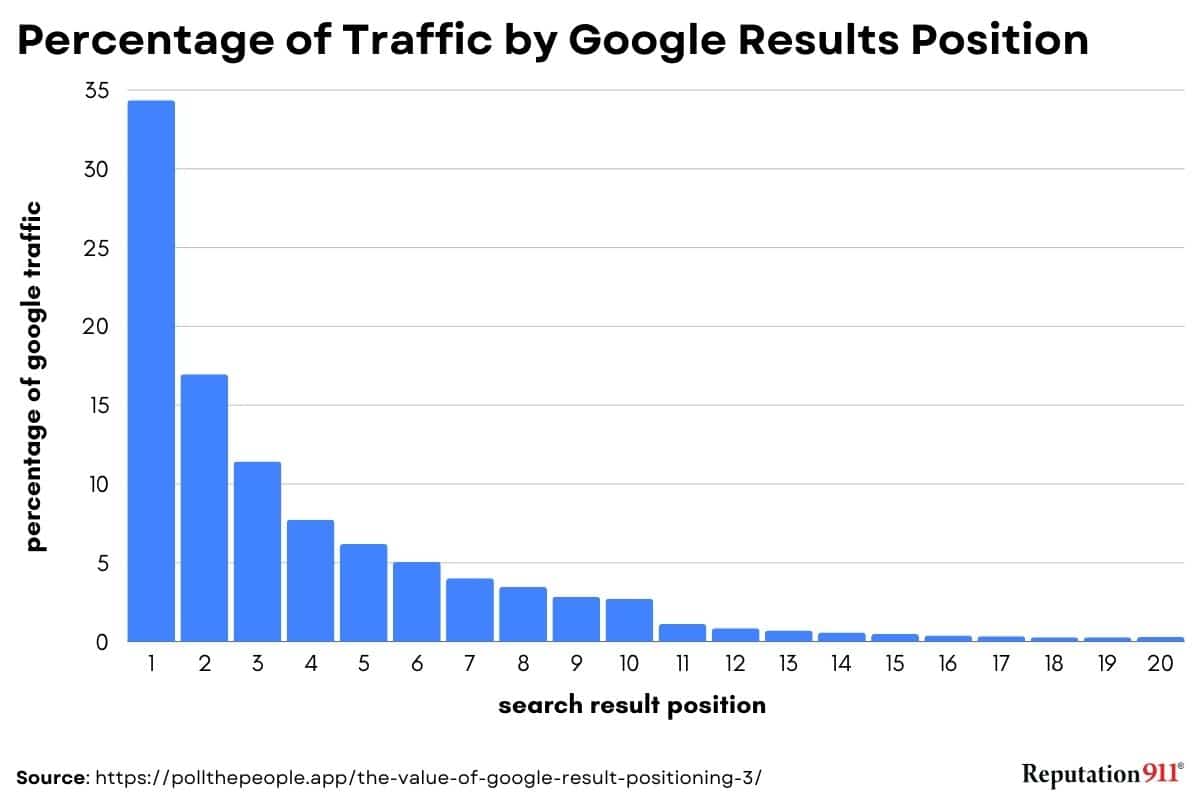
According to Poll The People, 76.65% of all traffic goes to the first 5 results on the Google SERP. The further down you push negative search results, the more likely it is no one will see it or click on it.
You can use this same tactic with images and videos. By publishing new images and videos that you want people to see, you suppress the ones you don’t want people to see.
4. Create new social media profiles
Social media can be extremely damaging to reputation due to the ease of content going viral and By creating new social media profiles, you can publish the kind of content you want people to see. You can also promote content from your own website, which will help with Google search suppression.
Content can go viral quickly on social media, and it isn’t always in your best interest. Managing your content on social media is critical. If something negative about you appears on social media, try to remove it if possible.
5. Guest blog posts
In addition to blogging on your own website, write guest blogs for other websites. Here are two main reasons for this:
- Guest blogging introduces you to new audiences who might have not otherwise heard about you
- Writing a guest blog usually means that the host’s website will link back to your own website. This helps to strengthen the search engine rankings of your site and can drown out negative articles.
6. Create a Wikipedia page
If you meet the notability requirements, try creating (or updating) your own Wikipedia page. Having a Wikipedia page is great for reputation management because the platform tends to rank highly in search results. However, not everyone qualifies for one, and you have to follow Wikipedia guidelines.
7. Crisis management
For businesses, crises can occur when you least expect it. Prepare your organization ahead of time so you can mitigate any potential damage to your brand’s reputation. Part of getting prepared is having a crisis management plan.
Individuals can also experience a crisis that affects their online presence, similarly to businesses. In this case, you need personal crisis reputation management.
8. Online review management
Reviews about your products or services can make or break your business. Reviews play an important role in how consumers make purchasing decisions. Because of this, review monitoring and management is critical.
Bad reviews are unavoidable, but they don’t have to ruin your business, as long as you know how to respond to them.
9. Public Relations
News articles are often the first thing that people see when they Google you or your business. Negative publicity can cause serious damage to your brand. However, using positive PR campaigns can help mitigate the damage.
How To Control Your Brand Perception In The Media
To control your online brand perception, you need to know how to influence different types of media. Here are the differences between owned, earned and paid media to use in your marketing strategy:
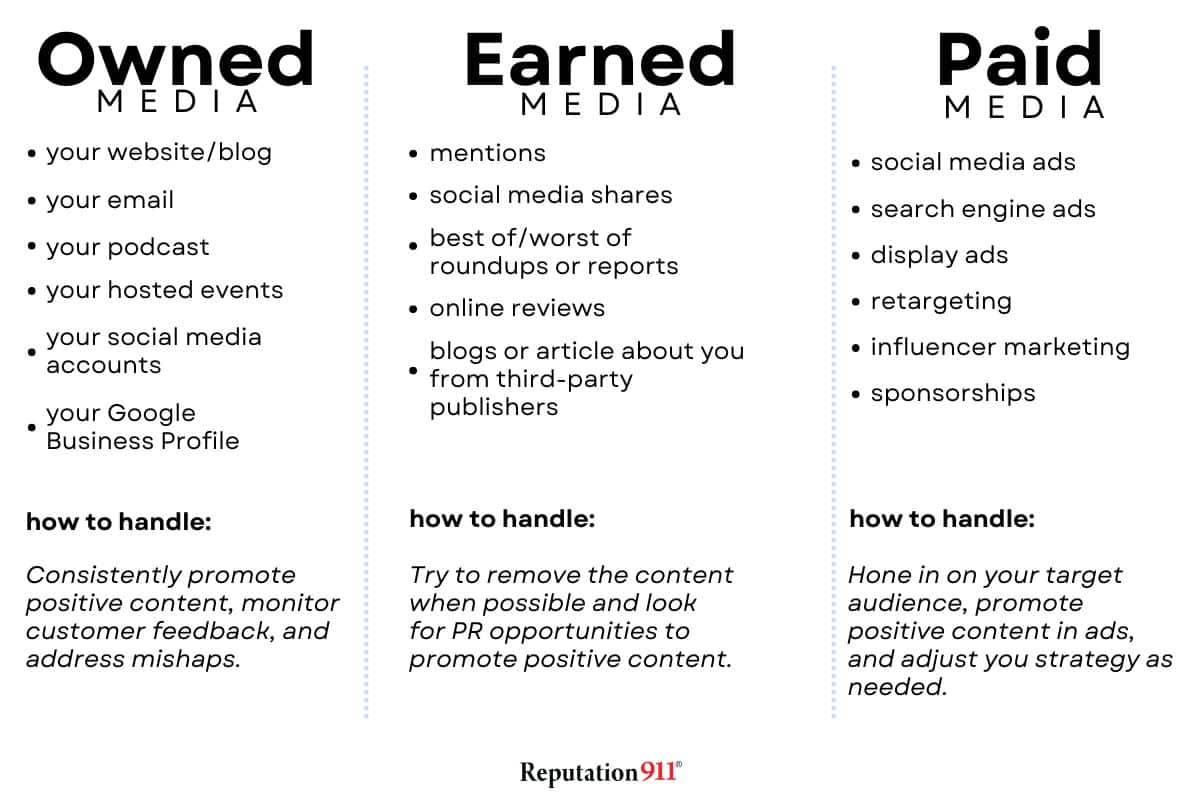
Understanding the differences between owned, earned, and paid media will help you influence what people see about you online.
Owned Media
Owned media is any type of media owned by your own brand. If you can publish content directly to it, you own it. This includes:
- Website
- Podcasts
- Blog
- Hosted Events
- Social Media accounts
- Google My Business profile
- Other Directory Sites
How to handle owned media:
- Promote positive content
- Be consistent with your message and branding
- Monitor customer feedback after you post content
- Address any mishaps or crisis on your owned channels
Earned Media
Earned media is any type of content online that other people publish about you. This includes:
- Mentions
- Social media shares
- Best of/worst of reports or roundups
- Online reviews
How to handle earned media:
- If someone publishes negative content about your brand, ask them to remove it
- If that doesn’t work, contact Google or the social media platform to get it removed
- Look for PR opportunities to promote positive content about your brand on other websites
Paid Media
Paid media is any online marketing that you pay for. This includes:
- Social media ads
- Search engine ads
- Display ads
- Retargeting
- Influencer marketing
- Sponsorships
How to handle paid media:
- Use demographic and psychographic targeting to make sure your ads reach your intended audience. Tailor your messaging to make your advertisements more effective.
- Leverage paid media to promote positive content, like customer testimonials, achievements, or community involvement.
- Monitor the performance of your paid media campaigns and adjust your strategy as needed.

How to Recover From a Bad Reputation (6 Steps)
If your brand has a negative online reputation, take these steps to mitigate the damage:
- Do some research to figure out the extent of the damage. Conduct a sentiment analysis to learn what the public thinks about your brand. Find and flag any negative content about you or your brand.
- If you are at fault for the situation, make amends. Issue a statement apologizing for any wrongdoings that have affected customers, stakeholders, and others.
- Simply issuing an apology is not enough. You need to create a long-term recovery plan. If you just say that you will do better, people won’t trust you. Instead, you have to show them that you are doing better.
- Proactively communicate any changes you have made to address the issues with your audience.
- Make it a priority to follow through on any commitments you have made. Consistency helps to rebuild trust with your audience.
- The recovery process doesn’t happen overnight, and can often take a long time, so patience is critical.
Reputation Management Tools
Automation helps you stay on top of negative content before it becomes a problem. Popular tools include Google Alerts, Semrush, and Ahrefs. In addition, check out these free reputation monitoring tools.
In Closing: When To Hire A Reputation Management Company
When repairing your reputation, you want to ensure you are taking the right approach. Reputation management companies can tailor their expert services to your specific needs. These services will cost you money, but you will get a return on investment.
Here is what to look for in a reputation management company:
- Do they offer comprehensive services?
- Do they customize their strategies for each client?
- Can they offer case studies or client references?
- How long have they been offering these services?
- Is their work both results based and in real time?
- Are they transparent about their pricing and services?
- Is their work guaranteed for the long-term?
- Do they offer monthly updates and reporting?
At Reputation911, our expert team is here to make you look good online. We offer both business and personal reputation management services, and employ a range of strategies suited to your needs. Contact us for a free consultation.
About The Author
William DiAntonio is the Founder & CEO of Reputation911, a reputation management firm he founded in 2010 that has earned the trust of its clients for over a decade by helping individuals, businesses and brands control their online search results.
- William DiAntoniohttps://reputation911.com/author/william-diantonio/April 12, 2024
- William DiAntoniohttps://reputation911.com/author/william-diantonio/April 5, 2024
- William DiAntoniohttps://reputation911.com/author/william-diantonio/
- William DiAntoniohttps://reputation911.com/author/william-diantonio/March 18, 2024
Free Consultation
About Reputation911
We have helped thousands of individuals and businesses remove and suppress negative content and unwanted search results since 2010.







